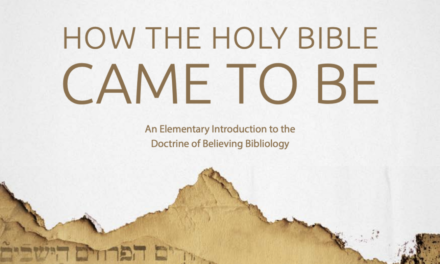The Only Begotten Son Versus Only Begotten God
By Dr. Edward Freer Hills
John 1:18, “No man hath seen God at any time; the only begotten Son, which is in the bosom of the Father, he hath declared him.”
This verse exhibits the following four-fold variation:
1. the only begotten Son, Traditional Text, Latin versions, Curetonian Syriac.
2. only begotten God, Pap 66, Aleph B C L, WH.
3. the only begotten God, Pap 75.
4. (the) only begotten, read by one Latin manuscript.

The first reading is the genuine one. The other three are plainly heretical. Burgon (1896) long ago traced these corruptions of the sacred text to their source, namely Valentinus. [1] Burgon pointed out that the first time John 1:18 is quoted by any of the ancients a reference is made to the doctrines of Valentinus. This quotation is found in a fragment entitled Excerpts from Theodotus, which dates from the 2nd century. R. P. Casey (1934) translates it as follows:
The verse, “in the beginning was the Logos and the Logos was with God and the Logos was God,” the Valentinians understand thus, for they say that “the beginning” is the “Only Begotten” and that he is also called God, as also in the verses which immediately follow it explains that he is God, for it says, “The Only-Begotten God who is in the bosom of the Father, he has declared him.” [2]
This passage is very obscure, but at least it is clear that the reading favored by Valentinus was precisely that now found in Papyrus 75, the only begotten God. What could be more probable than Dean Burgon’s suggestion that Valentinus fabricated this reading by changing the only begotten Son to the only begotten God? His motive for doing so would be his apparent desire to distinguish between the Son and the Word (Logos).
According to the Traditional reading, the Word mentioned in John 1:14 is identified with the only begotten Son mentioned in John 1:18. Is it not likely that Valentinus, denying such identification, sought to reinforce his denial by the easy method of altering Son to God (a change of only one letter in Greek) and using this word God in an inferior sense to refer to the Word rather than the Son? This procedure would enable him to deny that in John 1:14 the Word is identified with the Son. He could argue that in both these verses the reference is to the Word and that therefore the Word and the Son are two distinct Beings.
Thus we see that it is unwise in present day translators to base the texts of their modern versions on recent papyrus discoveries or on B and Aleph. For all these documents come from Egypt, and Egypt during the early Christian centuries was a land in which heresies were rampant.
Footnotes
1. The Causes of the Corruption of the Traditional Text of the Holy Gospels, by J.W. Burgon and E. Miller, London: Bell, 1896, pp. 215-218
2. “The Excerpta ex Theodoto of Clement of Alexandria,” edited with translation by R.P. Casey, Studies And Documents I, London: Christophers, 1934, p. 54
Source: The King James Defended by E.F. Hills, 133-134




